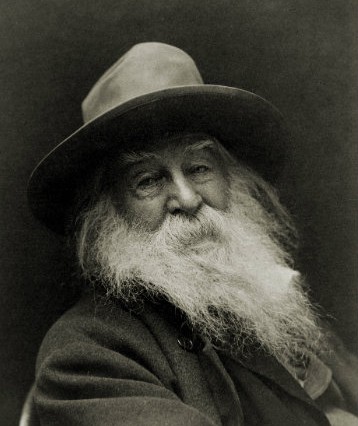Introduction
In September 1861, five months after the Confederates fired on Fort Sumter, Walter “Walt” Whitman (1819–1892) published his poem “Beat! Beat! Drums!” in Harper’s Weekly, urging Americans to take up the cause of the Union and join the war. The following year, he received news that his brother George was wounded in the Battle of Fredericksburg, and the poet set off to find him. Though his brother’s wounds were minor, Whitman was profoundly affected by his interactions with the wounded soldiers, and for much of the war he served as a volunteer nurse in Washington, DC. According to a 1915 profile in the Times Literary Supplement, between 1862 and 1865, Whitman visited eighty to a hundred thousand sick and wounded soldiers, “comprehending all, slighting none. Rebel or compatriot, it made no difference. ‘I loved the young man,’ [the poet] cries again and again.” This selection was published in 1865 in Whitman’s first anthology of his Civil War poetry, Drum-Taps.
In this poem and “Old War Dreams,” Whitman speaks of the way memories of war haunt the peacetime lives of the returning Civil War veterans. Going carefully through the details of this artilleryman’s nocturnal (but waking) vision, see if you can imagine how it makes him feel. Is he more frightened than excited? What does he mean by saying that the sound of cannon rouses “even in dreams, a devilish exultation, and all the old mad joy, in the depths of my soul”? How does battle remembered differ from battle experienced? Can a battle veteran ever be free from the memories of war?
While my wife at my side lies slumbering, and the wars are over long,
And my head on the pillow rests at home, and the vacant midnight passes,
And through the stillness, through the dark, I hear, just hear, the breath of my infant,
There in the room, as I wake from sleep, this vision presses upon me:
The engagement opens there and then, in fantasy unreal;
The skirmishers begin—they crawl cautiously ahead—I hear the irregular snap! snap!
I hear the sounds of the different missiles—the short t-h-t! t-h-t! of the rifle balls;
I see the shells exploding, leaving small white clouds—I hear the great shells shrieking as they pass;
The grape, like the hum and whirr of wind through the trees, (quick, tumultuous, now the contest rages!)
All the scenes at the batteries themselves rise in detail before me again;
The crashing and smoking—the pride of the men in their pieces;
The chief gunner ranges and sights his piece, and selects a fuse of the right time;
After firing, I see him lean aside, and look eagerly off to note the effect;
—Elsewhere I hear the cry of a regiment charging—(the young colonel leads himself this time, with brandish’d sword;)
I see the gaps cut by the enemy’s volleys, (quickly fill’d up, no delay;)
I breathe the suffocating smoke—then the flat clouds hover low, concealing all;
Now a strange lull comes for a few seconds, not a shot fired on either side;
Then resumed, the chaos louder than ever, with eager calls, and orders of officers;
While from some distant part of the field the wind wafts to my ears a shout of applause, (some special success;)
And ever the sound of the cannon, far or near, (rousing, even in dreams, a devilish exultation, and all the old mad joy, in the depths of my soul;)
And ever the hastening of infantry shifting positions—batteries, cavalry, moving hither and thither;
(The falling, dying, I heed not—the wounded, dripping and red, I heed not—some to the rear are hobbling;)
Grime, heat, rush—aid-de-camps galloping by, or on a full run;
With the patter of small arms, the warning s-s-t of the rifles, (these in my vision I hear or see,)
And bombs bursting in air, and at night the vari-color’d rockets.
Return to The Meaning of Veterans Day.




Post a Comment